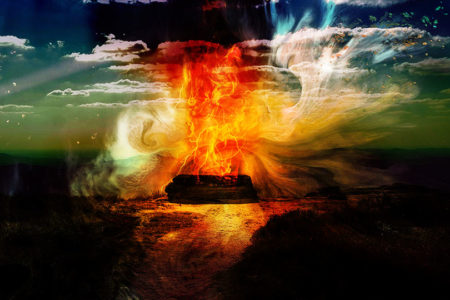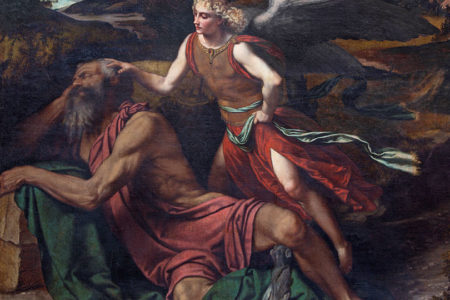What Heathenism Wrought
Elijah was an extraordinary prophet, but even more so because of the culture in which he lived.
Without any announcement, the prophet Elijah appeared in Israel and boldly confronted his generation with a strong warning from God. His messages thundered with pronouncements of judgment against the inky blackness of Israel’s evil spiritual night.
Israel had turned its back on the living God; and, like all nations that forsake the Almighty, it degenerated into a corrupt and heathenistic society. To understand Elijah’s greatness, we must understand the political and religious arenas in which he ministered.
Decline of the Kingdom
The Jewish kingdom’s decline began more than 100 years before Elijah came on the scene—in the days of King Solomon, who ruled from 970 to 931 BC.
Although blessed with more wisdom than any man on Earth, Solomon succumbed to the custom of his day and married many foreign women to cement political alliances. This practice, forbidden in the Mosaic Law (Dt. 17:17), hastened the nation’s spiritual decay.
Even more despicable, Solomon allowed his pagan wives to build altars to their gods (Ashtoreth, Milcom, Chemosh, and Molech) east of Jerusalem on the Mount of Olives, where the women practiced gross idolatry by burning incense and offering sacrifices.
Less than a century later, King Jehoram of Judah (r. 848–841 BC) sacrificed his firstborn son on the city wall to the heathen god Chemosh (2 Ki. 3:27). There are heartbreaking tales of children being sacrificed in the name of Molech, an abominable practice the Mosaic Law highly condemned (Lev. 20:2–5).
As time passed, Solomon’s wives turned his heart toward their idols, and Solomon did evil in the sight of the Lord. He was not fully devoted to the God of Israel, as was David his father. Because of Solomon’s pride, arrogance, idolatry, unbridled passion, and neglect of God’s Law, God ripped the kingdom from Solomon’s son Rehoboam—dividing it in two.
After Solomon’s death, Rehoboam, whose mother was an Ammonite, reigned over Israel. He proved to be an arrogant, frivolous, unintelligent man who was totally nonreligious and untrained in God’s Law. The seeds of wickedness that Solomon had sown produced the fruit of rebellion against the reign of his son.
An uprising ensued when a man named Jeroboam, along with the congregation of Israel, asked Rehoboam to ease the grievous burden of compulsory service and oppressive taxation that Solomon had levied on the nation. Taking the advice of his peers over that of his elders, Rehoboam replied, “My father made your yoke heavy, but I will add to your yoke; my father chastised you with whips, but I will chastise you with scourges” (1 Ki. 12:14).
Upon receiving this news, the 10 northernmost tribes seceded from the Davidic Kingdom. As prophesied, Jeroboam became the ruler of the northern kingdom, with Samaria as the capital. Rehoboam was left with Judah and Benjamin, the two southern tribes—plus Levi—with Jerusalem as the capital.
Depravity of the Kings
The northern kingdom expanded its borders, took control of the trade routes surrounding it, and became extremely prosperous. An upper-class society emerged that built expensive homes, enjoyed a carnal lifestyle, and exploited the poor. Corrupt leaders oppressed the people and committed violence and robbery, while merchants chafed at closing their businesses for religious observances.
Jeroboam (r. 931–910 BC) was not religious, but he knew Israel needed a god to worship. Not wanting his people to return to Rehoboam when they went to the Temple in Jerusalem, he set up golden calves in Bethel and Dan and appointed degenerate men as priests (not of the Levitical priesthood) to offer sacrifices in direct disobedience to God’s law (vv. 27–33). He established an abominable nation of apostasy built on human wisdom and designed to eliminate any need for pilgrimages to worship Jehovah, thus assuring undivided loyalty to his rule.
Soon Baal worship replaced true worship of God in Israel. Jeroboam laid the foundation for the despicable behavior that would later evoke God’s wrath and lead to Israel’s eventual demise. He ruled over the 10 tribes for 22 years (vv. 25–33; 14:19–20).
After Jeroboam, the northern kingdom survived through 18 more kings. Elijah passed off the scene with the death of King Ahaziah (852 BC; see “Israel’s Evil Kings“); and Elisha, his successor, began his ministry under King Jehoram.
All of the 19 kings who ruled in Israel were despicably wicked. Their behavior evoked God’s wrath, leading to Israel’s downfall. Assyria’s Tiglath-Pileser invaded the kingdom and laid siege to Samaria. His successor, Sargon II (r. 722–705 BC), continued the siege, capturing Samaria and the entire northern kingdom of Israel in 722 BC.
All Israel’s kings were required to write for themselves a copy of the Mosaic Law so they would remember what God required of them (Dt. 17:18–20). They all failed to do so.
Dedication of Elijah
Elijah appears suddenly, without preamble, in 1 Kings 17:1: “And Elijah the Tishbite, of the inhabitants of Gilead, said to Ahab, ‘As the LORD God of Israel lives, before whom I stand, there shall not be dew nor rain these years, except at my word.’”
Elijah’s name means “my God is Jehovah.” It is an apt name for the prophet who would minister to a generation of ungodly Israelites who were living like the heathen surrounding them. They had left Jehovah their God.
As with Melchizedek in Genesis 14, Scripture reveals nothing about Elijah’s ancestry, birth, father and mother, or his early life. When his ministry was completed, a whirlwind carried him to heaven as his protégé Elisha looked on (2 Ki. 2:1, 11).
Elijah is identified simply as “the Tishbite, of the inhabitants of Gilead” (1 Ki. 17:1). Many scholars believe he was from Tishbe in the area known as Gilead, but Tishbe’s location has never been determined with certainty. Gilead is a mountainous region 60 miles long and 20 miles wide, located east of the Jordan River and extending from the Sea of Galilee to the northern tip of the Dead Sea. It is bound on the north by Bashan and on the south by Moab and Ammon.
Elijah was a product of his time and place. Commentator Arthur Pink provided an apt picture:
The people of those hills reflected the nature of their environment: they were rough and rugged, solemn and stern, dwelling in rude villages and subsisting by keeping flocks of sheep. Hardened by an open-air life, dressed in a cloak of camel’s hair, accustomed to spending most of his time in solitude, possessed of sinewy strength which enabled him to endure great physical strain, Elijah would present a marked contrast with the town dwellers in the lowland valleys, and more especially would he be distinguished from the pampered courtiers of the palace.1
Few prophets in Israel’s history were as bold and varied as Elijah. Unlike others whose prophecies bear their names, Elijah has no book in the Bible that bears his name.
His moral character was sterling and uncompromising, and his faith and zeal for God were unequaled among prophets. With courage and boldness, he confronted kings, called out false religious leaders, and condemned idolatrous practices within Israel. He was unafraid to challenge the sinful deeds and demonic customs of his day. He not only spoke simply, directly, and sternly against evil, but he also declared divine judgment against the sins of Israel and its leaders, who continually threatened his life.
Although stern, bold, and courageous, Elijah was still a human being with human frailties. He experienced timidity, weakness, cowardliness, fear, doubt, and even depression—especially after a great victory over the prophets of Baal. He actually had a pity party, telling God he was the only faithful prophet left in Israel. However, God informed him 7,000 other Israelites also had not bowed their knees to Baal (19:10, 14, 18).
Elijah also exhibited a tender side. He was touched by the poverty of those living in need and hardship, and he showed mercy and loving compassion. This was especially true of his behavior toward a Gentile widow in Zarephath to whom he provided food and whose son he raised from the dead (17:8–24).
The impact Elijah had on Israel is so memorable it bridges both the Old and New Testaments. More is written about him in the New Testament than about any other prophet except Moses; Elijah is mentioned 30 times.
Furthermore, Elijah did not die. While he and Elisha walked together, a chariot of fire and horses appeared between them. A whirlwind swept up the prophet and, in one deathless step, carried Elijah from Earth into the everlasting glory of heaven (2 Ki. 2:11).
MALACHI: MESSENGER OF REBUKE AND REVIVAL
For more about Malachi, the final Old Testament book of prophecy, read David Levy’s book Malachi: Messenger of Rebuke and Revival.
Although the Old Testament phase of Elijah’s work was completed, his ministry would not be over by any means. The Old Testament ends with the following declaration: “Behold, I will send you Elijah the prophet before the coming of the great and dreadful day of the LORD. And he will turn the hearts of the fathers to the children, and the hearts of the children to their fathers, lest I come and strike the earth with a curse” (Mal. 4:5–6).
ENDNOTE
-
- A. W. Pink, The Life of Elijah (London, WI: The Banner of Truth Trust, 1956), 14.








Dear Mr. Levy,
Thanks so much for this article.
There’s so much more to learn.
God bless,
Naw Thinn Thinn Wai
Very informative,I could see what you were writing about as if I was there.Thank you and God bless.
Awesome as always, sir!